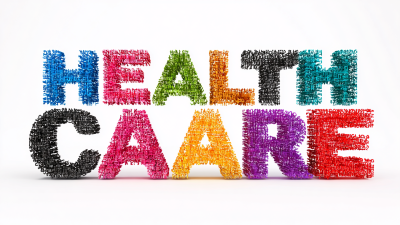Blog
Unlocking the Secrets to Sourcing Quality Healthcare Products for Your Business
In today's rapidly evolving healthcare landscape, sourcing quality healthcare products is paramount for businesses aiming to enhance patient outcomes and maintain a competitive edge. According to a report by the World Health Organization, ensuring access to quality healthcare products can lead to improved performance in health systems and a significant reduction in preventable illnesses. Furthermore, research by Grand View Research indicates that the global healthcare products market is expected to reach USD 1.5 trillion by 2028, highlighting the pressing need for companies to invest wisely in their procurement strategies. As stakeholders become increasingly aware of the impact that quality products have on overall care, understanding the nuances of sourcing these items effectively is crucial for business success. Hence, this blog will delve into actionable solutions for sourcing quality healthcare products, ensuring that healthcare providers not only meet regulatory requirements but also deliver superior patient care.

Identifying Key Criteria for Quality Healthcare Products Sourcing
When sourcing quality healthcare products, it's crucial to identify key criteria that ensure both reliability and effectiveness. According to a report by Grand View Research, the global healthcare supply chain market is projected to reach $3.1 trillion by 2025, highlighting the growing importance of quality sourcing in this competitive industry. Factors such as product reliability, compliance with regulatory standards, and supplier reputation are paramount. Understanding these elements aids businesses in making informed decisions that ultimately enhance patient care.
Tips: Always assess a supplier's certifications and track records before entering a contract. This not only mitigates risks but also fosters partnerships with reputable vendors. Additionally, staying updated with industry standards from organizations like the FDA or WHO can greatly influence sourcing quality products.
Investing in product testing and validation is another critical aspect. A study from the Healthcare Supply Chain Association indicates that healthcare organizations that implement rigorous quality controls can reduce product recall incidents by up to 30%. This not only protects your business from financial losses but also reinforces the trust patients place in your products and services.
Exploring Trusted Suppliers and Manufacturers in the Healthcare Sector
When sourcing quality healthcare products, finding trusted suppliers and manufacturers is crucial for ensuring the safety and efficacy of your offerings. According to a report by Grand View Research, the global healthcare market is expected to reach $11.9 trillion by 2027, highlighting the growing demand for reliable sourcing. This expansion underscores the necessity for businesses to partner with reputable suppliers that adhere to strict quality regulations and ethical practices.
One effective strategy to identify trusted partners is by leveraging industry certifications such as ISO 13485 and FDA approvals. These certifications not only demonstrate compliance with international standards but also enhance the credibility of suppliers in the eyes of stakeholders. Additionally, a recent study from Deloitte reveals that 60% of healthcare companies prioritize supplier reliability as a key factor in their procurement decisions. By focusing on suppliers with proven track records and positive reviews from industry peers, businesses can mitigate risks associated with product quality and increase customer trust.
Understanding Regulatory Compliance and Certification Requirements
Navigating the regulatory compliance landscape is crucial for businesses in the healthcare sector, particularly when sourcing quality products. Understanding the certification requirements that govern medical devices, pharmaceuticals, and other healthcare supplies is essential in ensuring market access and patient safety. Regulatory affairs can be complex, often hindered by intricate laws and guidelines that vary by region. This complexity necessitates a robust compliance strategy, especially for startups looking to make an impact in dynamic markets like Nigeria and the broader BRIC nations.

Startups must focus on conducting comprehensive compliance risk assessments tailored to their specific sector. For instance, in the healthcare industry, recognizing the legal implications surrounding corruption, public procurement, and fraud is vital. Additionally, as seen in the growing demand for governance, risk, and compliance (GRC) certifications, equipping teams with the necessary skills can significantly mitigate regulatory risks. Becoming well-versed in the regulatory landscape not only facilitates smoother market entry but also enhances the credibility of the business, paving the way for sustainable growth amidst an ever-evolving regulatory environment.
Evaluating Product Quality and Performance Metrics
When evaluating product quality and performance metrics in the healthcare sector, it is essential to adopt a holistic approach that encompasses various key performance indicators (KPIs). For instance, lessons learned from other industries, such as the food production sector, highlight the importance of performance evaluation systems that can effectively measure efficiency and sustainability. This includes utilizing metrics that assess not only the quality of the products but also their environmental impact, drawing insights from practices such as green procurement which have shown measurable benefits in other domains.
Moreover, the interplay between technology and quality assurance can significantly elevate product performance metrics. Recent studies indicate that incorporating digital strategies can enhance the relationship between quality certification and sales performance. By leveraging data science and machine learning algorithms, businesses can obtain empirical data that inform their quality assurance processes. This could lead to more informed decision-making and better alignment between product quality and market needs, ultimately ensuring that healthcare products meet the highest standards of safety and efficacy.
Unlocking the Secrets to Sourcing Quality Healthcare Products for Your Business - Evaluating Product Quality and Performance Metrics
| Product Type | Quality Rating (1-10) | Performance Metric | Supplier Reliability (%) | Price Range ($) |
|---|---|---|---|---|
| Surgical Instruments | 9 | Durability, Sharpness | 95 | 50 - 300 |
| Medical Devices | 8 | Accuracy, Ease of Use | 90 | 200 - 1000 |
| Personal Protective Equipment | 7 | Comfort, Breathability | 88 | 10 - 150 |
| Pharmaceutical Products | 9 | Efficacy, Safety | 95 | 5 - 2000 |
| Patient Monitoring Devices | 8 | Data Accuracy, Battery Life | 92 | 100 - 800 |
Building Strong Relationships with Healthcare Product Providers
Building strong relationships with healthcare product providers is essential for businesses aiming to thrive in the healthcare sector. A trust-based partnership can not only enhance product quality but also drive innovation. Establishing clear communication channels and understanding each other's goals are critical steps in this process. In fact, a recent survey indicated that companies with robust supplier relationships experience a 20% increase in collaboration efficiency, leading to better health outcomes.
To foster these relationships, consider the following tips: First, prioritize transparency in your dealings. Share your needs and expectations openly to create a common understanding. Second, investing in regular training and workshops can equip both parties with the knowledge needed to adapt to the industry's rapid changes. A well-informed partner is more likely to contribute innovative solutions.
Additionally, focusing on shared goals can strengthen your partnership. For instance, aligning your business objectives with those of your suppliers can lead to strategic collaborations that unlock value. As the healthcare landscape evolves, companies that emphasize these principles will be better positioned to navigate challenges, such as tariff impacts on global trade and the demand for digital and technology-enabled care solutions.

Related Posts
-

Exploring the Advanced Features of Quality Healthcare Products for Global Buyers
-

Navigating the World of Healthcare Solutions for Effective Procurement Strategies
-

Evaluating Global Trends in Health Care Products: A Data-Driven Comparison for Buyers
-

Leading Manufacturer in Health Medicine Solutions for Global Buyers
-

7 Ways Best Health Care Solutions Can Transform Your Life
-

Maximizing Your Benefits with Best Health Care Services in Home Care Solutions